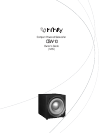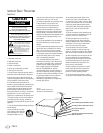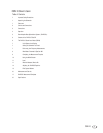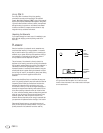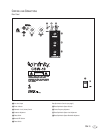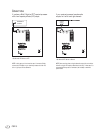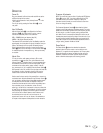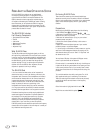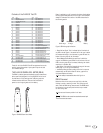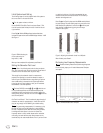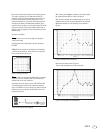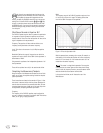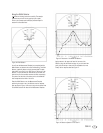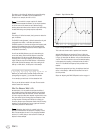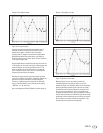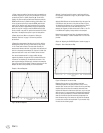
5
CSW-10
Infinity’s R.A.B.O.S. is a simple-to-use, yet sophisticated,
low-frequency calibration system. It is designed to work in
conjunction with the CSW-10 self-amplified subwoofer.The
CSW-10 subwoofer contains a parametric equalizer that you
will adjust as indicated by the R.A.B.O.S. test results. Following
these instructions, you will optimize the CSW-10’s response
characteristics to complement the sub’s environment.This will
dramatically improve the sound of your system.The optimization
process takes less than 30 minutes.
The R.A.B.O.S.Kit Includes
the Following Components:
• Specialized Sound-Level Meter
• Test CD
• Instructions
• Measurement Templates
• Width Selector
• Adjustment “Key”
What R.A.B.O.S.Does
The Test CD provides specially designed signals you will use
while performing measurements.The sound-level meter provided
is used to “acquire”the information needed for adjustments.You
will create a response plot on the Measurement Template. Using
the Width Selector, you will then determine the appropriate
equalizer settings.The “Key”is used to adjust the parametric
equalizer built into the CSW-10.After adjustment, the test
sequence is repeated to confirm your settings.
The R.A.B.O.S.Goal
It is a fact of audio that what we hear at low frequencies is
determined as much or more by the listening room than by the
loudspeaker itself. Placement of the loudspeakers and listeners
and the acoustical characteristics of the room surfaces are all
important determinants of bass quantity and quality. In most
practical situations, there is little that can be done about this,
except for patient trial-and-error repositioning of the
loudspeakers and listeners. Usually,the practical constraints
of a living space and the impracticality of massive acoustical
treatment mean that equalization is the only practical solution.
Professional sound engineers routinely employ sophisticated
measurement systems and equalizers to optimize speakers to
the installation.This has never been practical for the home
audiophile.This is why R.A.B.O.S. was created. R.A.B.O.S.
enables you to identify the dominant low-frequency response
characteristic of your room. Once you know the problem,
R.A.B.O.S. provides the tools needed to optimize the low-frequency
characteristics of the speakers to the room they are in,exactly as
the professional sound engineers do it.
Performing R.A.B.O.S.Tests
These instructions assume you have already installed your
subwoofer according to the information provided in the Owner’s
Guide. It is also assumed that all equipment in your entertainment
system is interconnected properly and is in good operating
condition.
Preparations
Before beginning R.A.B.O.S. tests, please check the following:
• Set R.A.B.O.S. switch
•
to On position.
• Make sure all three R.A.B.O.S. controls,
ª
,
‚
and
⁄
, on the
subwoofer are turned fully clockwise.
• Make sure the loudness contour (if any) on your receiver/
processor/preamp is turned off.
• Set the tone controls (Bass and Treble) to their center or
flat positions.
• Bypass all surround and effects features of your receiver/
processor/preamp or set to Stereo Bypass.
• If you are using a multichannel surround processor or receiver,
make sure all bass-management features are properly set.The
Audio channels should all be set to “Small”or “High-Pass” and
the subwoofer set to “On.”
You must have a CD player in the system.A CD player remote
control is quite convenient but not essential.
For best results, it is recommended that all major furnishings are
in place and that all doors and windows in the listening area are
in their normal positions.That is, if you normally listen to music
with all doors closed, then this is how they should be during this
procedure.
Try to minimize ambient noise while running tests.Turn off all
major appliances and any air conditioning or furnace fans.
These can create significant subsonic noise that may be barely
perceptible but which can wreak havoc on low-frequency
measurements.
Critical information is highlighted with this mark:
Helpful hints are marked with this symbol:
ROOM ADAPTIVE BASS OPTIMIZATION SYSTEM



